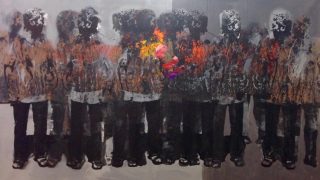Iraq’s present rulers are facing an unprecedented and powerful wave of popular dissent, with protests shaking Baghdad and other southern Iraqi cities. The strength of the protests has taken politicians by surprise, forcing them to shift their plans and start talking about reforms.
According to the redoubtable journalist Mostafa Nasser, there are 2,750 personnel assigned to guard the president and his deputies alone; 21,000 guards for the presidency, parliament and cabinet. The parliament has allocated 20 security guards for each member of Parliament, (they get to keep 10 of them even after they retire from their post), as well as five armored vehicles each. For the Prime Minister and his deputies, security and personal expenses cost 6.8 billion dinars [5.7 million dollars]. Security, medical, travel and other expenses for the rest of the MPs reach a total of 2.94 billion dinars. And when it’s over, a big retirement pension awaits every deputy, minister and high-ranking official (even those who only serve a few months in office); pensions that are often used to finance the official’s residence outside of Iraq.
Iraqis look at figures like these and see how the coalition of elites in power is recklessly squandering the country’s wealth. And these numbers are just the small, quantifiable figures in the vast wastage of public funds, a drop in the bucket of the state budget (although a telling one, since they expose the real value system of the political elite). Much larger figures are poured into the relationships between the dominant political forces and private businessmen, who have earned huge wealth from favorable government contracts, licenses and concessions. These relationships have developed in to political-financial coalitions which share power and resources.
In divided societies, the [Dutch] sociologist Arand Lijphart has argued that the model for democracy must be consensus power-sharing – his term is consociationalism. The stability of such a system, Lijphart says, requires the formation of an ‘elite cartel’ that emerges out of the various communal groups, and which agrees on sharing power. Lijphart’s ideas have been heavily criticized, and some have even questioned the applicability of his theory of consociationalism to his own case studies (Austria and his native Netherlands), while others have criticized his failure to clearly define a ‘divided society.’ Other questions arise as well: what is the distinction between ‘division’ and ‘pluralism’, and why assume that the division is ethnic or sectarian, rather than being based on social class for instance? Critics have also rejected his starting assumption that a cartel of elites will actually bring about stability and democracy through accumulated experience.
But these theoretical criticisms do not obviate the need to examine how Lijphart’s model performs in practice. Iraq has become a laboratory for experimenting with some of the assumptions of the consociationalism theory, and fertile ground for the development of an elite-cartel based democracy.
Lijphart’s model assumes the existence of elites who represent clearly distinct cultural groups, elites who can agree among themselves to form a ruling alliance that reflects the interests and needs of each group, while not marginalizing minorities. In Iraq, these ideas were applied [to the post-Saddam Hussein regime]due to several factors, chief among them the Orientalist thinking which predominated among Americans, who assumed that Iraqis are essentially composed of ethnicities and sects. The second factor is the interest-based agenda of the former opposition groups [which became ruling political parties after 2003]. They were driven by an obsession to avoid recreating the Sunni Arab hegemony which had until then marginalized both Kurdish speakers and Shi’ite Arabs. The form of government which emerged as a result of these influences was a consociational democratic state which contributed to the formation of new elites, and solidified the divisions between ethnic groups and religious sects to a degree that Iraq had never seen before. And accordingly representation of ethnic and sectarian interests transcend any [state]action in the interests of a broader citizenry.
Iraq’s situation today has deteriorated to the point that some argue the country must move to a stricter form of consociationalism, following the model of Bosnia. This would mean imposing stronger divisions among the country’s three main ethno-sectarian groups [Arabs who follow Sunni Islam, Arabs who follow Shi’ite Islam, and Kurds, who are generally Sunnis]; this is very nearly the de-facto situation now in any case. The argument is that a return to the pre-consociational state-without consensus power sharing between the elites of each group-is no longer possible.
However, the de-facto strict separation between social segments has in some ways begun to actually threaten the position of the elites who rose to power on the partial consociationalism of recent years. These elites have thrived on the mobilization of their various ‘groups’ through a politics of fear, both to ward off the threat of other groups, and to rebuff any ‘non-existential’ demands by constituents, putting off their everyday needs until the broader conflict is resolved. But with the ever-increasing separation between the various “groups,” each of them answerable to a different authority, and despite the danger posed by the Islamic State [ISIS/DAESH], the elites’ ability to use a politics of fear to achieve submission by their various constituencies has diminished. The decline of elite control is exacerbated by the ongoing economic crisis, which has made it more difficult for communal elites to absorb the demands of a youthful society in which hundreds of thousands of young people enter the job market every year, only to be hammered down by a lack of opportunity in a marketplace dominated by business tycoons.
It would certainly be false to blame the consociational system for everything that is wrong in Iraq; corruption after all exists in all forms of government. But we can well argue that the communal elite power sharing system, with its limited form of democracy, has help transform state institutions into party fiefdoms, crippling any chance for the ‘accountability’ that is central to any democratic regime. This parceling-out of state institutions into fiefdoms inherently includes a sort of agreement that grants every political force immunity for wrongdoing so long as it keeps itself within the bounds of the domain that has been assigned to it. And because the parliament itself has been included in this system of fiefdoms, it has lost its natural role as an agent of monitoring and accountability. Indeed for many Iraqis, the parliament has itself become the primary symbol of corruption.
Perhaps nothing illustrates the dire situation better than the case of one of the country’s ruling parties and its monopoly on the business of concrete barricades. Iraq’s cities are besieged with these concrete barriers, which are laid down to stop car bomb blasts-and practically speaking, this means that the booming business of concrete barriers is dependent on a continuing supply of bomb blasts. The same applies to the international scandal of the fake bomb-detecting wands which continued to be used in Iraq, even after a British court sentenced its fraudulent manufacturer to prison. One of the businessmen behind Iraq’s fake bomb-detector contract piled up so much wealth from the deal that he established his own political party, ran for parliament and won a seat.
Bilal Rehab, an energy researcher at the American University of Iraq in Suleimania, wrote his doctoral dissertation on how oil rent monies are administered in Iraq. According to Rehab, the fiefdom that administers the oil wealth has made it impossible for constitutionally-created institutions to abide by their own legal strictures. What exists in Iraq is instead a system of purely clientalistic networks, in which oil revenues are distributed among the political financial coalitions composed of [communal]elites and their constituencies. The only form of accountability in the system is the curbs that the various networks put on each other so that no one grabs too big a piece of the pie for himself.
This system was able to survive and grow in past years when oil prices were high and big revenues flowed in. Also in those years, military expenditures were not so enormous as now; they have grown dramatically since the war with the Islamic State began. In those years, the networks of elites were still forming, and had not finished dividing up all the various spheres of power. Each was busy using the revenues it controlled to establish new institutions, garner more profits, expand its constituency.
But when oil prices plunged and the country sank into austerity (the price of a barrel of oil has fallen by half), the regime’s problems began to accumulate. Its ability to manage conflicts between the networks which are its own components began to weaken. And those areas [of the regime]which were formerly open and capable of absorbing society’s demands by providing employment in the state’s civil and military institutions and keeping professional occupations sustainable, began closing down. And more importantly, the conflict with the Islamic State has produced alternatives to the solutions formerly offered by the elite. People began to see that the state could not defend them; the situation demanded the formation of a parallel army: public mobilization to face the Islamic State. The informal establishment of these parallel fighting forces has established a new understanding of legitimacy, and a new formula for the sharing out of power; and it is responding to the demands of new societal forces which were not satisfied with what they were offered under the distributional plan of the fiefdom-based system.
It is difficult to imagine the survival of the Lijphartian system of ‘elite cartels’ in its current form in Iraq today, unless it were to undergo major transformations, or unless the regime were to switch to a much more stringent form of consociationalism. [In practice] this would mean transforming Iraq into a confederation in which the central state administers the relationship between independent political units.
In order to survive, clientalistic networks need to grow. With growth stifled by decreases in revenues, networks come into conflict with one another. That is what happened between [the central state in]Baghdad and [the regional government in]Kurdistan, and the result was increasing economic independence between the two, with Kurdistan starting to export part of its oil via Kirkuk without consulting the federal government; in retaliation Baghdad stopped giving Kurdistan its share of the national budget. Overcrowding has begun plaguing the ‘groups’ from within as well, manifesting in Shi’ite vs. Shi’ite and Kurd vs. Kurd conflicts. This is due to the scramble of the various networks to absorb these communities’ shares. The competition has aggravated societal discontent even further because it only solidifies the gap between the elites’ fears and concerns, on one hand, and the demands of society, on the other.
This is how we reached the point where people took to the streets on a hot Iraqi summer, after a decade-old electrical power crisis exposed the sins of a regime incapable of managing public utilities or societal needs. They were protesting the elites and their corruption, stripping the regime – even if only symbolically- of the legitimacy it had presumed for itself as the representative of various groups. The protestors have acted as citizens, and not merely as members of petrified communal factions. The consociational system was in the end incapable of addressing their needs since it was an edifice constructed on identity politics instead of citizenship.
The ‘Arab Spring’ has taught us that mass protests can be manipulated in the service of particular political ends, that they can be stripped of their essence as societal discontent directed against the failure of the political elite. In the case of Iraq, the demonstrations were a protest against a narrow understanding of democracy as merely a procedural formula, rather than a system that reflects citizens’ needs. It became clear how warring factions intended to abuse the Iraqi protests in order to improve their status in the state’s distributional arrangement of wealth and power. This was the case with the religious group “Asa’ib Ahl al-Haq” (League of the Righteous) [which runs a Shi’ite paramilitary force], which aims to strengthen its political position by joining public mobilization and participating in protests. What is even clearer is that the anticipated continuation of the economic crisis and shrinkage of revenues will pave the way to a new phase of conflict inside the various “groups”, which signals the end of the political values and power sharing arrangements that created the post-2003 Iraq.
Translated by: International Boulevard







